C programming & data structure [character strings & string functions]
- 1. CProgramming Language & Data Structure Prepared by: Mo’meN M. Ali E-mail: [email protected]
- 2. References • www.stackoverflow.com • C Primer Plus 6th Edition • Let Us C 5th Edition • The C Programming Language 2nd Edition • C Modern Approach 2nd Edition • Data Structures and Algorithm Analysis in C 2nd Edition C Programming Language Mo’meN M. Ali
- 3. Review Programs are uploaded to this Git repo https://github.com/Mo2meN- Ali/x86/tree/master/Programming%20Course/2-Strings C Programming Language Mo’meN M. Ali
- 4. Topics • Arrays & Pointers. • Character String & String Functions. • Storage Classes, Linkage & Memory Management. • File Input/Output. • Structures & Other Data Formats. • Bit Fiddling. • The C Preprocessor & The C Library. • Algorithm Analysis & ADT. • Stacks & Queues. • Trees. C Programming Language Mo’meN M. Ali
- 5. Today You Will Learn About: • Functions: gets(), gets_s(), fgets(), puts(), fputs(), strcat(), strncat(), strcmp(), strncmp(), strcpy(), strncpy(), sprintf(), strchr(). • Creating and using strings. • Using several string and character functions from the C library and creating your own string functions. • Using command-line arguments. C Programming Language Mo’meN M. Ali
- 6. C Programming Language Mo’meN M. Ali // strings1.c #include <stdio.h> #define MSG "I am a symbolic string constant." #define MAXLENGTH 81 int main(void) { char words[MAXLENGTH] = "I am a string in an array."; const char * pt1 = "Something is pointing at me."; puts("Here are some strings:"); puts(MSG); puts(words); puts(pt1); words[8] = 'p'; puts(words); return 0; }
- 7. Output Here are some strings: I am an old-fashioned symbolic string constant. I am a string in an array. Something is pointing at me. I am a spring in an array. C Programming Language Mo’meN M. Ali • The puts() function, like printf(), belongs to the stdio.h family of input/output functions. • It only displays strings, and, unlike printf(), it automatically appends a newline to the string it displays. Note:
- 8. Character string constants (string literals) • A string constant, also termed a string literal, is anything enclosed in double quotation marks. • The enclosed characters, plus a terminating 0 character automatically provided by the compiler, are stored in memory as a character string. • The principal ways are using string constants, using char arrays, and using char pointers. A program should make sure there is a place to store a string. • Character string constants are placed in the static storage class, which means that if you use a string constant in a function, the string is stored just once and lasts for the duration of the program, even if the function is called several times. The entire quoted phrase acts as a pointer to where the string is stored. This action is analogous to the name of an array acting as a pointer to the array’s location. C Programming Language Mo’meN M. Ali
- 9. String Examples • char greeting[50] = "Hello, and" " how are" " you" " today!"; is equivalent to this: char greeting[50] = "Hello, and how are you today!"; • printf(""Run, Spot, run!" exclaimed Dick.n"); This produces the following output: "Run, Spot, run!" exclaimed Dick. C Programming Language Mo’meN M. Ali
- 10. C Programming Language Mo’meN M. Ali /* strptr.c -- strings as pointers */ #include <stdio.h> int main(void) { printf("%s, %p, %cn", "We", "are", *"space farers"); return 0; } 1. The %s format should print the string We. 2. The %p format produces an address. So if the phrase "are" is an address, then %p should print the address of the first character in the string. (Pre-ANSI implementations might have to use %u or %lu instead of %p). 3. *"space farers" should produce the value to which the address points, which should be the first character of the string "space farers“.
- 11. Output We, 0x100000f61, s C Programming Language Mo’meN M. Ali
- 12. Array and pointer differences • What’s The differences between initializing a character array to hold a string and initializing a pointer to point to a string. (By "pointing to a string," we really mean pointing to the first character of a string.) ? char heart[] = "I love Tillie!"; char *head = "I love Millie!"; • The chief difference is that the array name heart is a constant, but the pointer head is a variable. What practical difference does this make? C Programming Language Mo’meN M. Ali
- 13. C Programming Language Mo’meN M. Ali #define MSG "I'm special." #include <stdio.h> int main(void) { char ar[] = MSG; const char *pt = MSG; printf("address of "I'm special": %p n", "I'm special"); printf(" address ar: %pn", ar); printf(" address pt: %pn", pt); printf(" address of MSG: %pn", MSG); printf("address of "I'm special": %p n", "I'm special"); return 0; }
- 14. Output address of "I'm special": 0x100000f0c address ar: 0x7fff5fbff8c7 address pt: 0x100000ee0 address of MSG: 0x100000ee0 address of "I'm special": 0x100000f0c C Programming Language Mo’meN M. Ali
- 15. Arrays of character strings const char *mytal[LIM] = { "Adding numbers swiftly", "Multiplying accurately", "Stashing data", "Following instructions to the letter", "Understanding the C language“ }; • Because LIM is 5, you can say that mytal is an array of five pointers-to-char. That is, mytal is a one-dimensional array, and each element in the array holds the address of a char. The first pointer is mytal[0], and it points to the first character of the first string. The second pointer is mytal[1], and it points to the beginning of the second string. In general, each pointer points to the first character of the corresponding string • Review Program: Array as Pointers C Programming Language Mo’meN M. Ali
- 16. Rectangular versus ragged array C Programming Language Mo’meN M. Ali
- 17. The unfortunate gets() function • It’s a simple function, easy to use: 1. It reads an entire line up through the newline character. 2. Discards the newline character, stores the remaining characters. 3. Adding a null character to create a C string. • The problem is that gets() doesn’t check to see if the input line actually fits into the array, also, remember C naturally does not check for boundaries!! C Programming Language Mo’meN M. Ali
- 18. C Programming Language Mo’meN M. Ali /* getsputs.c -- using gets() and puts() */ #include <stdio.h> #define STLEN 81 int main(void) { char words[STLEN]; puts("Enter a string, please."); gets(words); printf("Your string twice:n"); printf("%sn", words); puts(words); puts("Done."); return 0; }
- 19. Output Enter a string, please. I want to learn about string theory! Your string twice: I want to learn about string theory! I want to learn about string theory! Done. C Programming Language Mo’meN M. Ali
- 20. puts() function • It take a string argument then prints it with adding a new line. • Which make it a natural company for the gets() function which discards the new line from input string. C Programming Language Mo’meN M. Ali
- 21. The fgets() function (and fputs() ) • The fgets() function meets the possible overflow problem by taking a second argument that limits the number of characters to be read. This function is designed for file input, which makes it a little more awkward to use. Here is how fgets() differs from gets() : 1. It takes a second argument indicating the maximum number of characters to read. If this argument has the value n , fgets() reads up to n-1 characters or through the newline character, whichever comes first. 2. If fgets() reads the newline, it stores it in the string, unlike gets(), which discards it. 3. It takes a third argument indicating which file to read. To read from the keyboard, use stdin (for standard input ) as the argument; this identifier is defined in stdio.h. C Programming Language Mo’meN M. Ali
- 22. fputs() function • It take a string argument then prints it without adding a new line. • Which make it a natural company for the fgets() function which discards the new line from input string. C Programming Language Mo’meN M. Ali
- 23. C Programming Language Mo’meN M. Ali #include <stdio.h> #define STLEN 14 int main(void) { char words[STLEN]; puts("Enter a string, please."); fgets(words, STLEN, stdin); printf("Your string twice (puts(), then fputs()):n"); puts(words); fputs(words, stdout); puts("Enter another string, please."); fgets(words, STLEN, stdin); printf("Your string twice (puts(), then fputs()):n"); puts(words); fputs(words, stdout); puts("Done."); return 0; }
- 24. Output Enter a string, please. apple pie Your string twice (puts(), then fputs()): apple pie apple pie Enter another string, please. strawberry shortcake Your string twice (puts(), then fputs()): strawberry sh strawberry shDone. Review Program: fgets C Programming Language Mo’meN M. Ali
- 25. The gets_s() function • The three main differences from fgets() are these: 1. gets_s() just reads from the standard input, so it doesn’t need a third argument. 2. If gets_s() does read a newline; it discards it rather than storing it. 3. If gets_s() reads the maximum number of characters and fails to read a newline, it takes several steps. It sets the first character of the destination array to the null character.It reads and discards subsequent input until a newline or end-of-file is encountered. It returns the null pointer. It invokes an implementation-dependent “handler” function (or else one you’ve selected), which may cause the program to exit or abort. C Programming Language Mo’meN M. Ali
- 26. The s_gets() function C Programming Language Mo’meN M. Ali char *s_gets(char * st, int n) { char * ret_val; int i = 0; ret_val = fgets(st, n, stdin); if (ret_val) // i.e., ret_val != NULL { while (st[i] != 'n' && st[i] != '0') i++; if (st[i] == 'n') st[i] = '0'; else // must have words[i] == '0' while (getchar() != 'n') continue; } return ret_val; }
- 27. The scanf() function • The chief difference between scanf() and gets() lies in how they decide when they have reached the end of the string: scanf() is more of a "get word" than a "get string" function. The gets() function, as you've seen, takes in all the characters up to the first newline. The scanf() function has two choices for terminating input. For either choice, the string starts at the first non-whitespace character encountered. If you use the %s format, the string runs up to (but not including) the next whitespace character (blank, tab, or newline). If you specify a field width, as in %10s, the scanf() collects up to 10 characters or up to the first whitespace character, whichever comes first. Mo’meN M. Ali C Programming Language
- 28. C Programming Language Mo’meN M. Ali /* scan_str.c -- using scanf() */ #include <stdio.h> int main(void) { char name1[11], name2[11]; int count; printf("Please enter 2 names.n"); count = scanf("%5s %10s",name1, name2); printf("I read the %d names %s and %s.n", count, name1, name2); return 0; }
- 29. Output Please enter 2 names. Jesse Jukes I read the 2 names Jesse and Jukes. Please enter 2 names. Liza Applebottham I read the 2 names Liza and Applebotth. Please enter 2 names. Portensia Callowit I read the 2 names Porte and nsia. C Programming Language Mo’meN M. Ali
- 30. Exercise 2.0 30 Minutes MO’MEN M. ALI C Programming Language
- 31. The Do-it-Yourself Option • Surprisingly enough, C offers a way to build your own string functions the way you want. • Using getchar(), putchar() and string.h functions. C Programming Language Mo’meN M. Ali
- 32. C Programming Language Mo’meN M. Ali /* put1.c -- prints a string without adding n */ #include <stdio.h> void put1(const char *string) /* string not altered */ { while (*string != '0') putchar(*string++); } • use const char *string rather than const char string[] as the formal argument? Technically, the two are equivalent, so either form will work. One reason to use bracket notation is to remind the user that the function processes an array. With strings, however, the actual argument can be the name of an array, a quoted string, or a variable that has been declared as type char *. Using const char *string reminds you that the actual argument isn’t necessarily an array. Note
- 33. C Programming Language Mo’meN M. Ali /* put2.c -- prints a string and counts characters */ #include <stdio.h> int put2(const char * string) { int count = 0; while (*string) /* common idiom */ { putchar(*string++); count++; } putchar('n'); /* newline not counted */ return(count); } Review Program: Put1_Put2
- 34. String library’s functions • he C library supplies several string-handling functions; ANSI C uses the string.h header file to provide the prototypes. We'll look at some of the most useful and common ones: strlen(), strcat(), strncat(), strcmp(), strncmp(), strcpy(), and strncpy(). We'll also examine sprintf(), supported by the stdio.h header file. C Programming Language Mo’meN M. Ali
- 35. The strlen() function The strlen() function, finds the length of a string. it adds 1 to the combined lengths to allow space for the null character. /* fit.c –– procrustean function */ void fit(char * string, unsigned int size) { if (strlen(string) > size) *(string + size) = '0'; } • This function does change the string, so the function header doesn't use const in declaring the formal parameter string. • Review Program: TestFit C Programming Language Mo’meN M. Ali
- 36. The strcat() function • The strcat() (for string concatenation) function takes two strings for arguments. A copy of the second string is tacked onto the end of the first, and this combined version becomes the new first string. The second string is not altered. It returns the value of its first argument. • Review Program: StringConcatenation C Programming Language Mo’meN M. Ali
- 37. The strncat() function • strncat() differs from strcat() in only one aspect which that, it takes a second argument indicating the maximum number of characters to add. • Review Program: StringConcatenation with checking C Programming Language Mo’meN M. Ali
- 38. The strcmp() function • The strcmp() function, Compares two string. It returns a negative number if the first string precedes the second alphabetically and that it returns a positive number if the order is the other way and it returns zero if the two strings are identical. C Programming Language Mo’meN M. Ali Note: The strcmp() function is for comparing strings , not characters . So you can use arguments such as "apples" and "A" , but you cannot use character arguments, such as 'A‘. • Review Program: String Comparison
- 39. The strncmp() function • The strncmp() function is different from strcmp() in one manner which that it compares the strings until they differ or until it has compared a number of characters specified by a third argument. C Programming Language Mo’meN M. Ali
- 40. The strcpy() function • The strncpy() function copies the second argument string into the first argument string. 1. The first argument need not point to the beginning of an array; this lets you copy just part of an array. 2. It returns the value of its first argument. 3. It does no check to see if the first argument has the space or not which may cause overflow problems. C Programming Language Mo’meN M. Ali The strncpy() function • The strncpy() function only difference that it copies the n character of the second argument string into the first argument string. • Review Program: String Copy
- 41. The sprintf() function • The sprintf() function is declared in stdio.h instead of string.h. It works like printf(), but it writes to a string instead of writing to a display. Therefore, it provides a way to combine several elements into a single string. The first argument to sprintf() is the address of the target string. The remaining arguments are the same as for printf()— a conversion specification string followed by a list of items to be written C Programming Language Mo’meN M. Ali • Review Program: form a string
- 42. Other String Functions MO’MEN M. ALI C Programming Language Search Yourself
- 43. Exercise 2.1 30 Minutes MO’MEN M. ALI C Programming Language
- 44. Selection Sort Algorithm Sorts a list of a strings alphabetically C Programming Language Mo’meN M. Ali • Review Program: Sorting String
- 45. Command-Line Arguments • The command line is the line you type to run your program in a command-line environment. • Command-Line Programs takes input into a special Argument called *argv[] which is Array of pointers. • All input to the program are saved as strings in *argv[] one by one. • argv[0] always contains the name of the program. So user input is to be found strating from argv[1]. • argc contains the number of inputs that has been passed to the program plus the program name. C Programming Language Mo’meN M. Ali • Review Program: form a string
- 46. C Programming Language Mo’meN M. Ali /* repeat.c -- main() with arguments */ #include <stdio.h> int main(int argc, char *argv[]) { int count; printf("The command line has %d arguments:n", argc - 1); for (count = 1; count < argc; count++) printf("%d: %sn", count, argv[count]); printf("n"); return 0; }
- 47. Output $ repeat Resistance is futile The command line has 3 arguments: 1: Resistance 2: is 3: futile C Programming Language Mo’meN M. Ali
- 48. C Programming Language Mo’meN M. Ali /* hello.c -- converts command-line argument to number */ #include <stdio.h> #include <stdlib.h> int main(int argc, char *argv[]) { int i, times; if (argc < 2 || (times = atoi(argv[1])) < 1) printf("Usage: %s positive-numbern", argv[0]); else for (i = 0; i < times; i++) puts("Hello, good looking!"); return 0; }
- 49. Output $ hello 3 Hello, good looking! Hello, good looking! Hello, good looking! C Programming Language Mo’meN M. Ali
- 50. THANK YOUSEE YOU SOON C Programming Language Mo’meN M. Ali






![C Programming Language
Mo’meN M. Ali
// strings1.c
#include <stdio.h>
#define MSG "I am a symbolic string constant."
#define MAXLENGTH 81
int main(void)
{
char words[MAXLENGTH] = "I am a string in an array.";
const char * pt1 = "Something is pointing at me.";
puts("Here are some strings:");
puts(MSG);
puts(words);
puts(pt1);
words[8] = 'p';
puts(words);
return 0;
}](https://image.slidesharecdn.com/cprogrammingdatastructure-characterstringsstringfunctions-150709232537-lva1-app6891/85/C-programming-data-structure-character-strings-string-functions-6-320.jpg)


![String Examples
• char greeting[50] = "Hello, and" " how are" " you" " today!";
is equivalent to this:
char greeting[50] = "Hello, and how are you today!";
• printf(""Run, Spot, run!" exclaimed Dick.n");
This produces the following output:
"Run, Spot, run!" exclaimed Dick.
C Programming Language
Mo’meN M. Ali](https://image.slidesharecdn.com/cprogrammingdatastructure-characterstringsstringfunctions-150709232537-lva1-app6891/85/C-programming-data-structure-character-strings-string-functions-9-320.jpg)

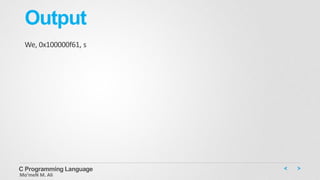
![Array and pointer differences
• What’s The differences between initializing a character array to hold a string and
initializing a pointer to point to a string. (By "pointing to a string," we really mean pointing
to the first character of a string.) ?
char heart[] = "I love Tillie!";
char *head = "I love Millie!";
• The chief difference is that the array name heart is a constant, but the pointer head is a
variable. What practical difference does this make?
C Programming Language
Mo’meN M. Ali](https://image.slidesharecdn.com/cprogrammingdatastructure-characterstringsstringfunctions-150709232537-lva1-app6891/85/C-programming-data-structure-character-strings-string-functions-12-320.jpg)
![C Programming Language
Mo’meN M. Ali
#define MSG "I'm special."
#include <stdio.h>
int main(void)
{
char ar[] = MSG;
const char *pt = MSG;
printf("address of "I'm special": %p n", "I'm special");
printf(" address ar: %pn", ar);
printf(" address pt: %pn", pt);
printf(" address of MSG: %pn", MSG);
printf("address of "I'm special": %p n", "I'm special");
return 0;
}](https://image.slidesharecdn.com/cprogrammingdatastructure-characterstringsstringfunctions-150709232537-lva1-app6891/85/C-programming-data-structure-character-strings-string-functions-13-320.jpg)

![Arrays of character strings
const char *mytal[LIM] = {
"Adding numbers swiftly",
"Multiplying accurately", "Stashing data",
"Following instructions to the letter",
"Understanding the C language“
};
• Because LIM is 5, you can say that mytal is an array of five pointers-to-char. That is,
mytal is a one-dimensional array, and each element in the array holds the address of a
char. The first pointer is mytal[0], and it points to the first character of the first string.
The second pointer is mytal[1], and it points to the beginning of the second string. In
general, each pointer points to the first character of the corresponding string
• Review Program: Array as Pointers
C Programming Language
Mo’meN M. Ali](https://image.slidesharecdn.com/cprogrammingdatastructure-characterstringsstringfunctions-150709232537-lva1-app6891/85/C-programming-data-structure-character-strings-string-functions-15-320.jpg)


![C Programming Language
Mo’meN M. Ali
/* getsputs.c -- using gets() and puts() */
#include <stdio.h>
#define STLEN 81
int main(void)
{
char words[STLEN];
puts("Enter a string, please.");
gets(words);
printf("Your string twice:n");
printf("%sn", words);
puts(words);
puts("Done.");
return 0;
}](https://image.slidesharecdn.com/cprogrammingdatastructure-characterstringsstringfunctions-150709232537-lva1-app6891/85/C-programming-data-structure-character-strings-string-functions-18-320.jpg)


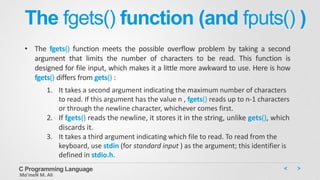
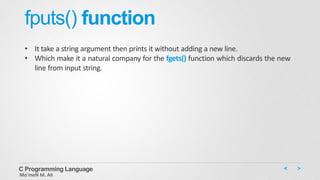
![C Programming Language
Mo’meN M. Ali
#include <stdio.h>
#define STLEN 14
int main(void)
{
char words[STLEN];
puts("Enter a string, please.");
fgets(words, STLEN, stdin);
printf("Your string twice (puts(), then fputs()):n");
puts(words);
fputs(words, stdout);
puts("Enter another string, please.");
fgets(words, STLEN, stdin);
printf("Your string twice (puts(), then fputs()):n");
puts(words);
fputs(words, stdout);
puts("Done.");
return 0;
}](https://image.slidesharecdn.com/cprogrammingdatastructure-characterstringsstringfunctions-150709232537-lva1-app6891/85/C-programming-data-structure-character-strings-string-functions-23-320.jpg)

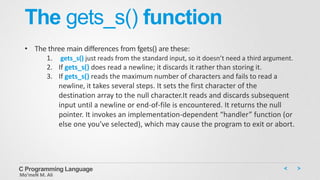
![The s_gets() function
C Programming Language
Mo’meN M. Ali
char *s_gets(char * st, int n)
{
char * ret_val;
int i = 0;
ret_val = fgets(st, n, stdin);
if (ret_val) // i.e., ret_val != NULL
{
while (st[i] != 'n' && st[i] != '0')
i++;
if (st[i] == 'n')
st[i] = '0';
else // must have words[i] == '0'
while (getchar() != 'n')
continue;
}
return ret_val;
}](https://image.slidesharecdn.com/cprogrammingdatastructure-characterstringsstringfunctions-150709232537-lva1-app6891/85/C-programming-data-structure-character-strings-string-functions-26-320.jpg)
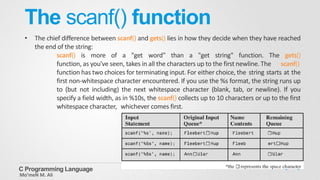
![C Programming Language
Mo’meN M. Ali
/* scan_str.c -- using scanf() */
#include <stdio.h>
int main(void)
{
char name1[11], name2[11];
int count;
printf("Please enter 2 names.n");
count = scanf("%5s %10s",name1, name2);
printf("I read the %d names %s and %s.n",
count, name1, name2);
return 0;
}](https://image.slidesharecdn.com/cprogrammingdatastructure-characterstringsstringfunctions-150709232537-lva1-app6891/85/C-programming-data-structure-character-strings-string-functions-28-320.jpg)

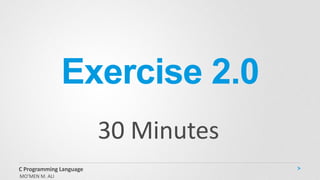
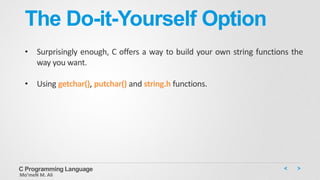
![C Programming Language
Mo’meN M. Ali
/* put1.c -- prints a string without adding n */
#include <stdio.h>
void put1(const char *string) /* string not altered */
{
while (*string != '0')
putchar(*string++);
}
• use const char *string rather than const char string[] as the
formal argument? Technically, the two are equivalent, so either form will work.
One reason to use bracket notation is to remind the user that the function
processes an array. With strings, however, the actual argument can be the
name of an array, a quoted string, or a variable that has been declared as type
char *. Using const char *string reminds you that the actual argument
isn’t necessarily an array.
Note](https://image.slidesharecdn.com/cprogrammingdatastructure-characterstringsstringfunctions-150709232537-lva1-app6891/85/C-programming-data-structure-character-strings-string-functions-32-320.jpg)
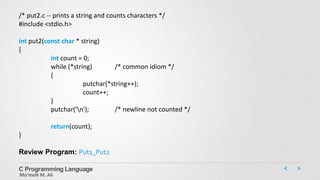
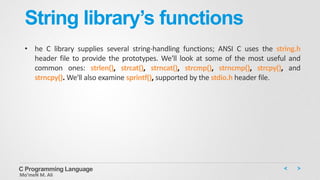

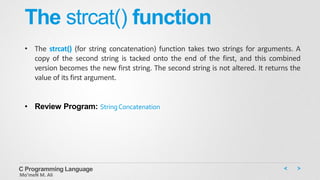








![Command-Line Arguments
• The command line is the line you type to run your program in a command-line
environment.
• Command-Line Programs takes input into a special Argument called *argv[]
which is Array of pointers.
• All input to the program are saved as strings in *argv[] one by one.
• argv[0] always contains the name of the program. So user input is to be
found strating from argv[1].
• argc contains the number of inputs that has been passed to the program plus
the program name.
C Programming Language
Mo’meN M. Ali
• Review Program: form a string](https://image.slidesharecdn.com/cprogrammingdatastructure-characterstringsstringfunctions-150709232537-lva1-app6891/85/C-programming-data-structure-character-strings-string-functions-45-320.jpg)
![C Programming Language
Mo’meN M. Ali
/* repeat.c -- main() with arguments */
#include <stdio.h>
int main(int argc, char *argv[])
{
int count;
printf("The command line has %d arguments:n", argc - 1);
for (count = 1; count < argc; count++)
printf("%d: %sn", count, argv[count]);
printf("n");
return 0;
}](https://image.slidesharecdn.com/cprogrammingdatastructure-characterstringsstringfunctions-150709232537-lva1-app6891/85/C-programming-data-structure-character-strings-string-functions-46-320.jpg)

![C Programming Language
Mo’meN M. Ali
/* hello.c -- converts command-line argument to number */
#include <stdio.h>
#include <stdlib.h>
int main(int argc, char *argv[])
{
int i, times;
if (argc < 2 || (times = atoi(argv[1])) < 1)
printf("Usage: %s positive-numbern", argv[0]);
else
for (i = 0; i < times; i++)
puts("Hello, good looking!");
return 0;
}](https://image.slidesharecdn.com/cprogrammingdatastructure-characterstringsstringfunctions-150709232537-lva1-app6891/85/C-programming-data-structure-character-strings-string-functions-48-320.jpg)

